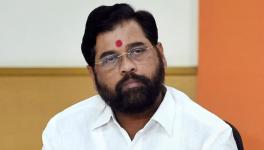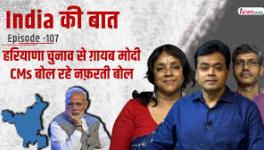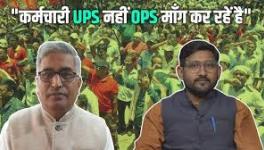Covid-19: How Compliant Media Erodes Democracy

Image Courtesy: National Herald
When the second wave of the pandemic was raging through India in April and May, at least one Indian was dying of Covid-19 every 30 seconds [since 28 April 2021]. India set a new record for the highest number of daily new infections and deaths. A severe shortage of oxygen and health infrastructure, poor administrative controls, and discord between the Union and the states cost many lives that might have been saved.
Despite this gloomy scenario, a section of the mainstream media kept on pushing a rosy pro-government narrative. As has often happened in recent years, the new narrative is being propagated in the name of upholding India’s reputation. However, the difference during the second wave is that this narrative is not being projected onto an ideological issue. In other words, the media is not busy defending the government’s positions on Hinduism, Hindutva or the state of the economy. Instead, it is glossing over the government’s failure to handle the pandemic that is causing the deaths of Indians over unavailability of essential health services.
While on ideological issues the media can easily go all-out to support the government, it is concerning that it is recasting ground realities to make them appear not-so-grim despite widespread panic and despair.
For instance, when bodies washed up on the banks of the Ganga in Bihar, Times Now, a prominent English news channel, did an on-ground report of the site on 10 May. Yet, on its prime show ‘India Upfront’ aired the same evening, its anchors opened the show by generally reassuring its viewers that things are “not looking as bad as they were just a few days ago”. By then, around 2,000 abandoned bodies had been found along a 1,140 km stretch of the river. India officially lost about 38,000 people between 1 May and 10 May and about 41,000 between 11 May and 20 May.
The question is, how did the media get here? A possible explanation lies in understanding how populist leaders view the world. Previous research informs that many populists are skeptical of intermediaries or mediators of public discourse, in which one can count the judiciary, the legislature, other institutions, and especially the media. Populist regimes see these mediators as part of elitist structures and project them as a hurdle between the will of the people and the populist leader’s desire to fulfill that will. In a democratic setup, such mediators enable the distribution of power. They help keep each arm of the government in check, which is anathema to a populist leader. In their bid to keep strengthening their position of power, they seek to work around institutions to establish a direct, seemingly personalised and unmediated, connection with people.
One way to foster this connection is to ensure one-way communication with the people that is also self-hosted. This is what former prime minister late Indira Gandhi had sought to do, and Prime Minister Narendra Modi does, much more effectively, with his Mann ki Baat monologues. This allows populists to escape expert critical scrutiny and talk about issues they consider necessary. Importantly, one-way communication allows them to build context for “their people” in a way that suits the leader and his supporters best.
Nowadays, a direct connection is significantly easier to forge on social media platforms. Conventional media avenues that do not fall in line, whether they are domestic or foreign, are labeled as distorters of the truth.
In the absence of checks and balances, India’s institutions have weakened significantly. Instead of circumventing the conventional media entirely, populist leaders at the helm in India subsume most mainstream media outlets within their communication machinery. Many reports have highlighted how a large section of Indian media has a pro-government bias. In this way, an important means for people to hold governments accountable is lost. Any critical narrative, no matter how constructive, gets branded as anti-national.
A media culture that defends the government irrespective of circumstances erodes the need to fix accountability and limits the scope of opposition. Simultaneously, the credibility of Opposition parties’ politics takes a battering. For instance, as the country grappled with the shortage of medical oxygen—an outcome of poor capacity-building after the first wave of the pandemic—the same TV news channel discussed how a task force set up to address the shortage of oxygen applauded the Union government for how it managed the issue. The blame for deficiencies was dubiously put on the faulty administration by state governments. The channel’s claim was based on “sources”. The task force had not put out any press note when the program was aired on the night of 10 May.
Every day in India, opposition parties are pulled up for critiquing the government and tagged as elitist, anti-national and ineffective. Lately, the Congress party was criticised by sections of English and Hindi mainstream media after the BJP accused the Congress of creating a “toolkit” that its followers could use to defame India. This toolkit, the BJP alleged, laid out ways for the Opposition to use the COVID-19 crisis to dent the Indian government’s image.
A prominent Hindi news channel, Zee News, amongst others, first conveniently provided a disclaimer that the channel could not verify the legitimacy of the toolkit. However, it still elaborated the allegations of the BJP on the ways in which the Congress “intended” to lower India’s image. It did not focus on the Congress’ defense against such allegations (based on the snippet uploaded by the News channel on its YouTube channel). The latter video is a useful example of how important checks and balances have a gone for a toss, because the influential sections of the media, instead of ensuring the ‘check and balance’ of airing all sides of a story, instead end up establishing the legitimacy of anti-opposition allegations. By the time a few online media houses contended that the ‘toolkit’ was forged, considerable damage was already done. An anti-Opposition narrative forged on the basis of allegations and not solid evidence is a cause of concern for the health and sustenance of democratic ethos.
Of late, people are indeed upset over the loss of loved ones during the pandemic, evident through many individual accounts. So, the communication machinery is in search of a scapegoat to divert public attention. Times Now then aired a show that talked about a connection between the farmer protests and the deaths due to COVID-19. With origins of the novel coronavirus back in focus, media channels have found a topical and effective theme to turn attention solely onto China.
Newslaundy, a reader-supported digital media company, discussed one news story by Zee News in their regular show, ‘TV Newsance’ on 13 March. A BJP leader picked up an anecdote from the Raj Bhawan website, and twisted it to target the Congress party. No sooner did it start trending on Twitter, Zee News presented it as a piece of investigative journalism. The anecdote was a show of Raj Bhavan hospitality whose staff once flew former Prime Minister Jawaharlal Nehru’s favorite brand of cigarette from Indore to New Delhi because the Raj Bhavan did not have any. The anchor presented estimates of the fuel, the flight itself, and sundry other costs of arranging cigarettes for Nehru. The show talked about the current value of this money, which had been spent over half a century ago. Along with the irrational timing, the “news” story provided another opportunity to report less about the ongoing oxygen constrains in hospitals, the high COVID-19 deaths, slow vaccination, amongst other critical issues.
India witnessed an overwhelming number of COVID-19 deaths because it is severely short of health infrastructure. It is the Indian government that is responsible for the lives of people in India. The Union government, through the Disaster Management Act, took primary control over managing the pandemic last year. The procurement of essential medicines and supplies was in the central government’s domain in 2020. Of late, the distribution of vaccine (also in short supply) is back in the control of the Union government (mostly). A silver lining is the Supreme Court’s remarks on the responsibility of the Centre to procure vaccines and do away with multiple price policy for vaccines. How, then, did the media machinery hold the states solely responsible for the crisis? Rationality is muddied when issues are driven onto an emotional turf. It is natural for angry, grieving people to latch on to the straw men created by the communication machinery. A glib argument is disseminated as the answer to a complex issue, and the enemy created in the process becomes a punching bag.
This derails the public from finding a solution to the problem and, worse, gives a false sense of satisfaction and victory. The relentless retelling of this pro-government narrative convolutes logic and discredits rationality. A lively press is supposed to foster rationality and question elected representatives and all those who are in positions of power.
As another instance, take Republic, a widely-watched TV channel. Christophe Jaffrelot, professor of Indian Politics and Sociology at King’s College London, shows in an article (co-written by the first author of this piece), that between 2017 and 2020, Republic TV hosted 100 anti-Opposition party debates for every eight debates critical of the government or the ruling party.
While we do not agree with the paper titled “Democracy Devouring Itself: The Rise of the Incompetent Citizen and the Appeal of Right Wing Populism”, particularly owing to its pessimistic tone, the author, Shawn Rosenberg, who teaches political science and psychological science at the University of California, Irvine, proffers a pertinent explanation. He notes that right-wing populists who create flawed accountability systems are on the rise of late because the elites—experts and public figures—are losing “control of institutions that have traditionally saved people from their most undemocratic impulses”.
When left to make political decisions on their own in a regulated public sphere, people tend to drift towards simple-sounding populist proposals. A common misunderstanding is that elections and electoral victories reflect the finality of democratic politics. On the contrary, elections are the first step towards building a democracy. Rosenberg explains that democracy is hard work and requires sincere public participation. It demands that people study large amounts of information, separate the legitimate from the fake, be thoughtful, disciplined and logical. He pessimistically argues that humans simply are not built for this job. But if so, then do populists have a clear advantage?
There is reason to be hopeful that this is not so. India has had many socio-political and democratic movements. The country needs to revive the idea that politics is a means to bring about social change. It is simple to pledge unshaken support to a leader, but democracy demands that citizens think for themselves, and think hard! To put it differently, the shortage of hospital beds and oxygen plagues the country today, but tomorrow may bring another crisis. Populists will keep getting away unless held accountable. Informed political deliberation is both a civic right and constitutional responsibility.
Vihang Jumle is a data analyst based in Mumbai. Vignesh Karthik KR is a doctoral researcher at King’s India Institute, King’s College London. The views are personal.
Get the latest reports & analysis with people's perspective on Protests, movements & deep analytical videos, discussions of the current affairs in your Telegram app. Subscribe to NewsClick's Telegram channel & get Real-Time updates on stories, as they get published on our website.
























